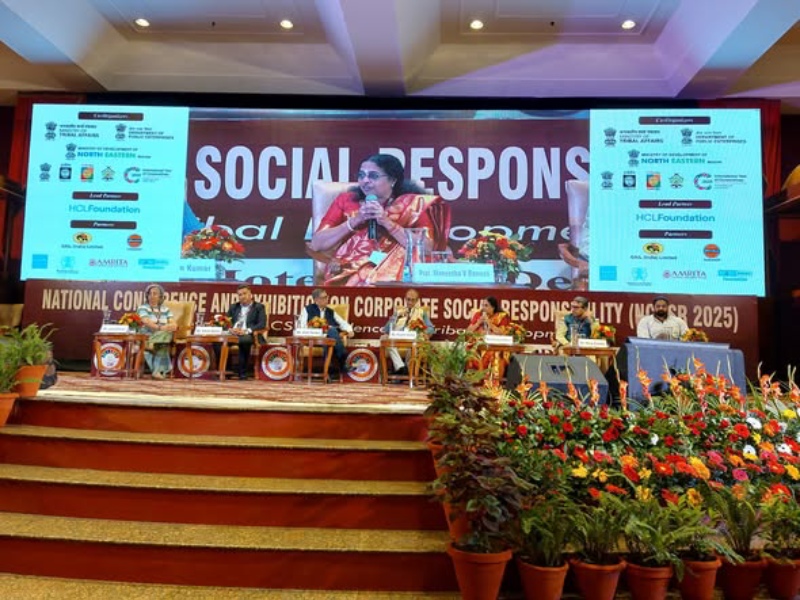Programs
- M. Tech. in Automotive Engineering -Postgraduate
- Building Disaster Resilience and Social Responsibility through Experiential Learning: Integrating AI, GIS, and Remote Sensing -Certificate

Dr. Maneesha V Ramesh, Amrita’s Pro Vice-Chancellor, represented the university at the National CSR Conference held in New Delhi October 6-7, 2025, alongside distinguished government officials, corporates, development practitioners, and tribal entrepreneurs from across the country.
This year’s theme was “Leveraging CSR Excellence for Tribal Development”, focusing on how corporate social responsibility can be meaningfully channelled to support India’s indigenous communities.
Dr Maneesha underscored trust-building, long-term commitment, and multi-stakeholder engagement as the foundations of sustainable community empowerment. Speaking at the session for CSR & Digital Inclusion: Tech for Tribal Financial Education and Market Access, she shared Amma’s vision of compassion-driven research.
She highlighted that while CSR projects often last only one to three years, real transformation requires enduring partnerships involving corporates, civil society, and local communities. She shared Amrita’s extensive work across India through Community Resilience Resource Centers in 14 states, which support 10–15 villages each in areas like agriculture, livelihoods, health, and education.
“It is not just about funding; at Amrita, we take a long-term approach where a multi-stakeholder engagement involves monitoring and evaluating the progress that is happening. Our Community Resilience Resource Centers train women on financial and digital literacy, as well as on gender equality. We tackle multiple issues with one initiative using a participatory and co-design approach,” she said.
Dr Maneesha explained how Amrita’s initiatives such as Live-in-Labs® and the E4Life PhD Program focus on collaboration with community members. Students and faculty live within villages to co-create solutions, which includes using technologies like AR/VR and AI as tools for livelihoods and education. The session concluded that CSR can be a catalyst for widespread change when integrated with technology, cultural sensitivity, and government frameworks.
Dr Maneesha also participated in the Live CSR Tribal Welfare Problem-Solving Lab. “We handhold members to start enterprises, train them in marketing, finance, and logistics, and ensure transformation of entire communities, not just individuals,” she said, reaffirming that Amrita’s approach goes far beyond grant making. It focuses on building self-reliant communities through long-term engagement, capacity development, and digital empowerment.
She expressed that sustainable CSR requires systemic participation of tribal groups, women, and youth in the project design. Drawing from Amma’s initiatives, she showcased AmritaSREE Self-Help Groups, which empower 250,000 women in India through vocational training, financial literacy, and entrepreneurship support.
She also discussed projects like Heritage Herald, which integrates AR/VR technology with cultural storytelling to enhance artisans’ market access, and Saukhyam Reusable Pads, a CSR-supported women-led social enterprise to produce menstrual pads that are eco-friendly and promote hygiene for women and girls.
Overall during the conference, Dr Maneesha emphasised that trust, participation, and compassion must guide CSR interventions, which can then become a force multiplier for inclusive tribal development. Lasting social transformation can take place in our modern age through a merging of technology, heritage, and human empathy. With the event organised as part of the 150th Birth Anniversary Commemoration of Mahatma Gandhi, Dr Maneesha reflected Gandhiji’s ideals of trusteeship, patience, and collaboration to form the moral foundation for building self-reliant and resilient communities across India’s tribal heartlands.